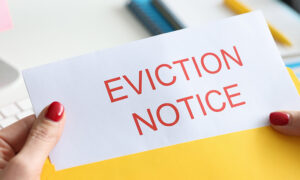Landlords can give tenants a 3-day notice in Florida to ask them to pay for rent. Otherwise, the landlord has the right to evict the tenant. However, how does a landlord enforce this rule? What requirements must they follow? Let’s find out.
What Is the 3-Day Notice in Florida?
As part of the rental agreement, tenants must pay the landlord on time. If they do, there will be no complications in the rental agreement, and the landlord-tenant relationship can continue as is. However, there are times when tenants fail to fulfill their financial obligation to the landlord. What can landlords do when this happens?
Thankfully, certain Florida eviction laws protect landlords from incurring great financial losses. This includes the law regarding the 3-day notice in Florida. The 3 day notice Florida Statute is found under Section 83.56(3). It states landlords can terminate rental agreements with tenants who fail to pay rent when it’s due. They can do this if the tenant defaults for 3 days, excluding Saturdays, Sundays, and court-observed legal holidays.
However, the state of Florida’s 3 day eviction notice requires that the landlord deliver the letter to the tenant in writing. The notice must demand payment or possession of the rental property within 3 days from the notice’s delivery date. Likewise, the time frame excludes weekends and court-observed legal holidays. Moreover, the letter must include specific information regarding the sum the tenant owes, the rental property address, and the deadline to fulfill the landlord’s demand.
How to Serve a 3-Day Notice in Florida
Landlords who want to serve a 3-day notice in Florida must only write a simple letter. The 3 day notice to vacate template must include the following:
- A statement saying the tenant is 3 days late with rent, excluding Saturdays, Sundays, and legal holidays
- The exact rental amount owed
- Address of the leased premises, including county and State
- A demand saying the tenant has 3 days, excluding Saturdays, Sundays, and legal holidays, to pay rent or evacuate the rental unit from the date of delivery
- Payment deadline (date, month, and year)
- Landlord’s name, address, and phone number
After writing the letter, the landlord must deliver the notice to the tenant. They can do this by delivering the notice or having the sheriff deliver it. They can also mail or post the notice to the tenant’s door.
What Happens After a 3 Day Eviction Notice in Florida?
Receiving the 3-day notice in Florida for tenants is usually serious business. Once received, tenants have only two options: pay the past due rent or move out of the property within 3 days. However, the landlord must add 5 days if they mail the notice. They must extend the timeframe if the notice tells the tenant to pay the rent to an out-of-town address or a post office box.
If the tenant chooses to pay rent, they must do so within the deadline. This is because landlords can refuse past-due payments. They can also refuse payments that are less than the full amount. However, the rent owed does not include security deposits, repair costs, or late fees. The landlord can only add these charges to the rent owed if the written lease agreement considers said charges as rent.
When paying rent, tenants must remember to keep the receipt. The receipt should include the exact amount paid and the date. If possible, they can also bring someone along to serve as a witness to what happened. This can protect the tenant if the landlord unjustifiably refuses to accept the payment.
What Happens When Tenants Ignore the 3-Day Notice in Florida?
 Landlords can evict tenants if they fail to pay rent or move out within the given time frame. How long does an eviction take after a 3-day notice in Florida? It usually takes a few days or even over a week. This is because the landlord must file a lawsuit before evicting the tenant.
Landlords can evict tenants if they fail to pay rent or move out within the given time frame. How long does an eviction take after a 3-day notice in Florida? It usually takes a few days or even over a week. This is because the landlord must file a lawsuit before evicting the tenant.
During the lawsuit, the landlord’s goal will be to obtain a Judgment for possession. If the landlord wins, the judge will issue a Writ of Possession notice and give the tenant only 24 hours to move out. Afterward, the landlord can prevent the tenant from entering the property.
However, filing a lawsuit may take a lot of work for the landlord as there are many requirements, including:
- Paying the court a filing fee
- Filing complaint papers with the court
- Providing the tenant with the Service of Process papers (i.e. the landlord’s Complaint and the Summons)
Landlords usually serve the papers through hand delivery by the sheriff’s office. If the tenant is missing or cannot be found, the landlord can serve the papers by taping copies to the tenant’s door. This is called posting. They must also mail another copy to the tenant by the court clerk’s office.
After serving the lawsuit papers, landlords will no longer accept rent payments. The tenant will now have 5 days to respond to the lawsuit by submitting their response, called the Answer, to the court. Tenants will have 5 days from when the papers were given to them or posted on their door.
They can still pay the rent they owe, but they’ll have to give payments to the clerk’s office instead of the landlord. Moreover, tenants can provide proof (copies of receipts) of any rent payments they made that were claimed in the lawsuit.
If the tenant disagrees with the amount stated, they can also ask the court to decide the amount they must pay. This is called a Motion to Determine Rent. They must also submit this to the court clerk’s office.
What Happens If a Landlord Gets a Judgement of Possession?
If the landlord wins, the tenants must move out within 24 hours. They must move their belongings to a storage unit or a different residence. If the tenant fails, the landlord can remove their belongings and place them at the property line. They can also keep the tenant’s belongings as payment for the rent owed. This is called a landlord’s lien. Alternatively, landlords can even store the belongings and make the tenant pay storage fees to retrieve them.
However, it’s usually not a good idea to keep the tenant’s belongings. This is because the tenant can file for a landlord’s lien exemption with the court. Afterward, there will be a hearing with the judge, and the tenant may be able to obtain up to $1,000 worth of their belongings back.
 Can Landlords Evict Tenants Without a Lawsuit?
Can Landlords Evict Tenants Without a Lawsuit?
No. Landlords may sometimes be tempted to force non-paying tenants by turning off utilities. They may even be tempted to remove the tenant’s belongings, restrict their access to the home, or change the locks and doors. However, this is illegal even if the tenant has not paid rent. The landlord needs a court order to evict the tenant.
Landlords should be careful as this can lead to liability. The tenant may sue the landlord, leading to payment for actual damages or 3 months’ worth of rent, whichever is bigger.
A Lengthy But Necessary Process
The 3-day notice in Florida is a great way for landlords to demand payment from non-paying tenants. It can sometimes be necessary, especially if the tenant is habitually late. However, landlords should never take matters into their own hands. They should always follow the procedures outlined in Florida law to avoid liability.
Are you a landlord in need of a property management company in Florida? Look through our online directory today!
RELATED ARTICLES: